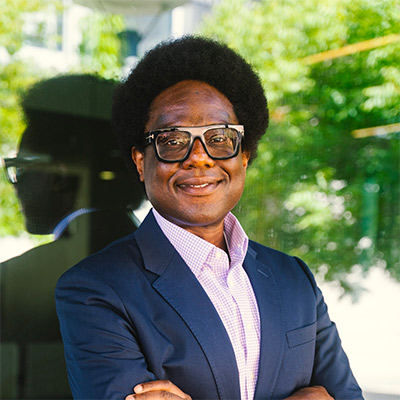By Gwyneth K. Shaw

Professor Osagie K. Obasogie has won a prestigious Guggenheim Fellowship to further his groundbreaking scholarship probing the intersection of race, medicine, and the law.
Obasogie plans to use the opportunity to expand his work on “excited delirium,” a vague and controversial term often used by medical examiners and coroners to explain why community members die in police custody. His article examining how the condition is often tied to in-custody deaths was published in the Virginia Law Review last year.
“Excited delirium is thought to be a psychiatric condition that can lead individuals to become so agitated that they suddenly and spontaneously die,” says Obasogie, the only person on the faculties of both Berkeley Law and the UC Berkeley School of Public Health. “However, there’s one problem: There is little scientific evidence to support the idea that excited delirium even exists.”
The term was coined in the 1980s to explain deaths that were thought to result from consuming small amounts of cocaine, but is now often applied as a theory for what caused the death of someone in custody. Lawyers for Derek Chauvin, the officer who murdered George Floyd, raised it at his trial.
“My work will continue to understand the history of this condition, how it is disproportionately used to explain how poor people and people of color die in police custody, and how it became a popular way for some medical professionals to use science and medicine to obscure, excuse, and even justify police violence,” Obasogie says.
A gratifying honor
He was “thrilled and grateful” upon hearing he’s one of 180 Guggenheim Fellows this year. Winners receive one-time grants to give them the time to focus on their research, books, or other projects. The class of 2022 runs the gamut from choreographers to engineers, with big cohorts of writers and fine artists, and includes two other UC Berkeley professors.
“The Guggenheim Fellowship has been awarded to so many extraordinary artists and scholars since its inception in 1925. It’s truly an honor to join this community and to have my work supported by this wonderful and generous foundation,” Obasogie says. “I’m most excited about meeting the other Guggenheim fellows. They are such a diverse and extraordinary group. I’m very much looking forward to learning and sharing with them.”
Obasogie earned his law degree at Columbia and his Ph.D. in sociology at Berkeley. He taught at UC Hastings College of the Law before being recruited to the School of Public Health as part of its Joint Medical Program with UCSF in 2016. He is the Haas Distinguished Chair and leads the Diversity and Health Disparities Cluster as part of the university’s Othering and Belonging Institute. In 2021, he joined the Berkeley Law faculty and was also elected to the National Academy of Medicine.
As a sociologist of law and medicine, Obasogie combines doctrinal scholarship with empirical methods and novel theoretical approaches to understand the ways that race is central to how the institutions of law and medicine operate. He is a core faculty member of Berkeley Law’s interdisciplinary Ph.D.-granting Jurisprudence and Social Policy (JSP) program, which has a long tradition of drawing social scientists from many fields together to train new generations of legal scholars, and a faculty co-director of the Berkeley Center for Law & Technology.
“Osagie Obasogie’s Guggenheim Fellowship is so exciting for him and for Berkeley Law,” Dean Erwin Chemerinsky says. “Osagie is one of the leading scholars looking at a myriad of issues at the intersection of law and public health, including policing issues. The Guggenheim is a wonderful reflection of his great accomplishments.”
The fellowship is “a testament to the beautiful community that I’ve been fortunate to be a part of since I joined the academy,” Obasogie says. “I feel indebted to the colleagues and family members who have supported my work, and I’m grateful for their sacrifice, kindness, and generosity.”
With Berkeley as his intellectual home since he arrived in 2002 as a Ph.D. student, he says he’s deeply appreciative of the university’s scholarly atmosphere. The ability to work fluidly across disciplines and draw on an array of theories, methods, and intellectual traditions has allowed him to pursue new avenues with his work. The Guggenheim Fellowship is a gratifying validation of that approach.
“Some view my work as a bit quirky since it transcends so many fields all at once,” Obasogie says. “Berkeley’s culture of thinking outside the box in our scholarly pursuits has been a tremendous asset to my career.”